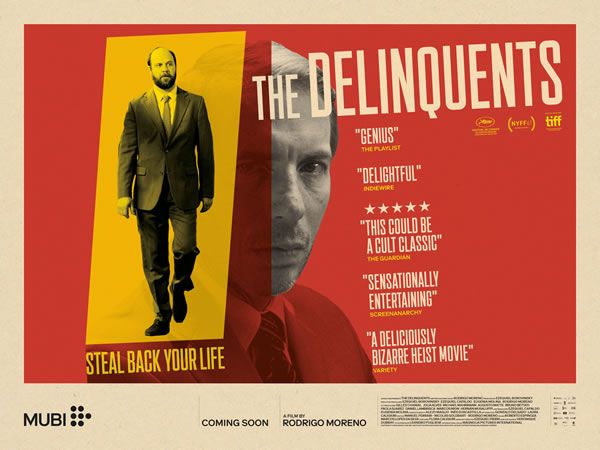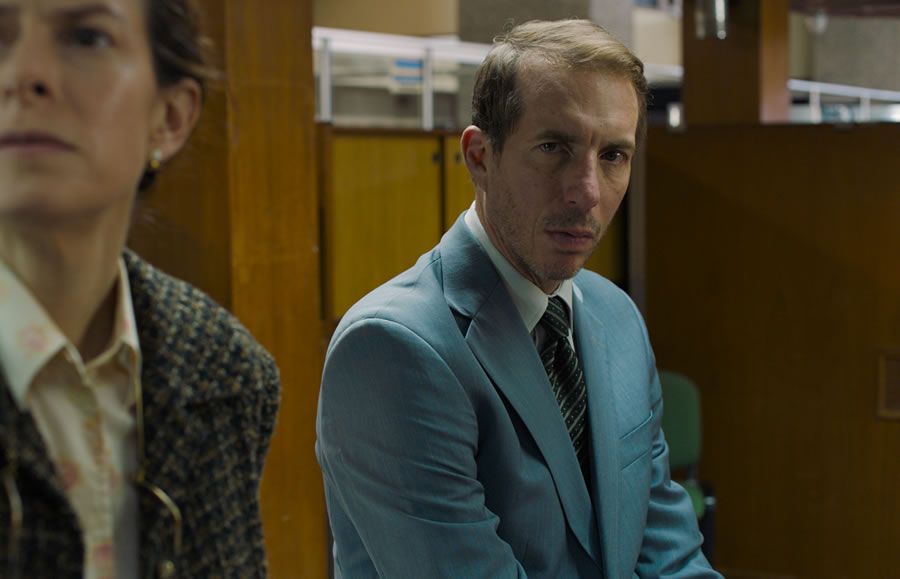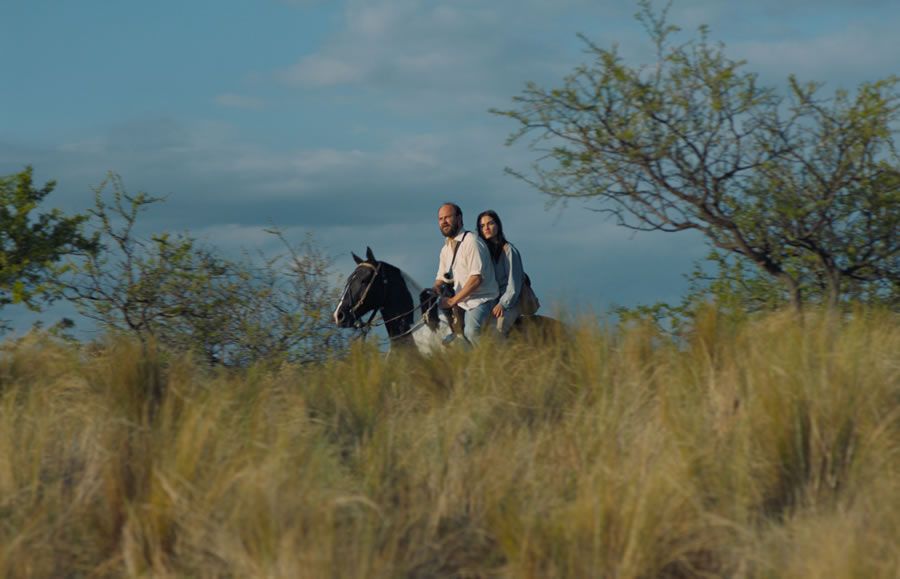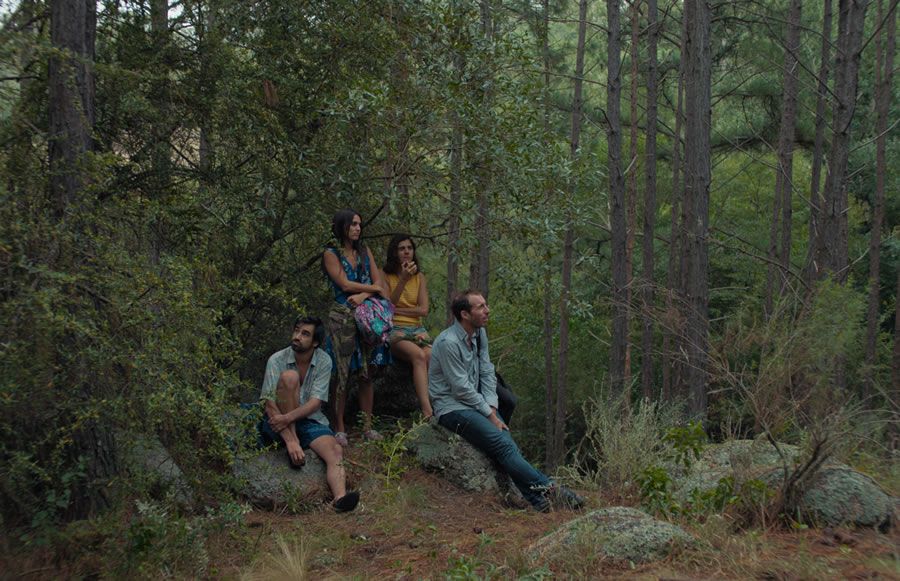10/17/2023
Review 'The Delinquents': An Authentic Fable on Happiness, Sacrifice, and Freedom
By Sandra M Ríos U
Twitter: @sandritamrios
To carry out a theft to gain time and live life to the fullest. The moral dilemma between pleasure, sacrifice, and freedom in this authentic fable by Rodrigo Moreno.
Due to religions, the pursuit of pleasure and happiness has been condemned, assuming sacrifice and even pain as the best path to attain them, and there is an association between pleasure and guilt regarding their deserving. Experiencing pleasure and happiness or feeling overwhelmed by them poses a moral dilemma that can even have ethical implications.
Those virtues advocated by philosophers like Epicurus and Aristotle find in capitalism the greatest obstacle for humans to achieve and thrive in their fullness, which is often also linked to effort - the more effort, the greater the reward, as the saying goes. Pleasure for pleasure, happiness in exchange for little is not well-received. So, people spend a significant part of their existence distracted by meeting their basic needs and fulfilling their obligations, immersed in work routines that consume their time.

The fantastic existential fable by Argentine director Rodrigo Moreno speaks about that, about time, happiness, and freedom. "The Delinquents" is not a conventional heist movie; it is a story where its two protagonists execute a theft to buy time for themselves and experience the good life. It's no more than that! "Steal back your life," as their slogan says.
To highlight the rat race of modernity, the two characters in "The Delinquents" are a pair of bank employees in Buenos Aires who have been working for more than 15 years and still have a few more decades until they can retire. There is a lot of time left, and daily life and routines weigh them down. So, Morán decides to steal from the bank the exact amount of salaries he needs to reach his retirement, but multiplied by two. He has chosen one of his colleagues and offered him the same, on the condition that he becomes the custodian of the money while Morán turns himself in to the police and serves a six-year (maximum) sentence, which may be less due to good behavior. Morán accepts the sacrifice of serving a relatively short sentence in exchange for being able to break free from the cage and dedicate the rest of his life to enjoyment. Surprised and skeptical, the deal is accepted by Román.

The three-hour movie is divided into two parts. In the first part, we see how the plan is executed to the letter and the consequences it has for other colleagues not involved in the theft. Moreno draws a constant parallel, with few differences, between Morán serving his sentence behind bars and Román's increasingly unexciting life, now burdened with the pressure of hiding a loot, which represents an epic escape from his suffocating lifestyle. All of this is presented with a comedic tone that enhances the irony of this well-intentioned adventure that could be the dream (and nothing more) of many.
The second part is a different movie, one where the conventions of drama, thriller, and heist films completely dissolve. There is no acceleration, explosion, tension, chases, desperate men searching for what's lost, or fugitives trying not to leave a trail. There aren't even any police. What there is, is full contemplation. Contemplation of the idyllic rural area where Román arrives to hide the money in a safer place, and contemplation of the life that people there lead, which allows this character to understand Morán's ultimate purpose: yes, to live life to the fullest. At this point, the movie introduces us to a group of three friends (one of them is a filmmaker of sorts), who live in harmony with nature and what the environment can offer them. They become a magnet, especially the free spirit of Norma, for these two men who see how it's possible to live the way they desire. And I like that this is an adult movie, with people in around their forties experiencing the kind of leisure that nourishes the spirit, enjoying their free time, doing nothing, having fun with small and innocent things, reminiscing about childhood games.

And that's where the movie takes a different turn, breaking all conventions. These two delinquents are neither pursued – at least not in the way we typically conceive it, and it's not shown to us – nor do they spend their days before the reunion delirious about being discovered. This part shows us paradise, the ideal of human enjoyment. However, Moreno goes further, and in the many creative licenses he takes in this film, he pays homage to cinema itself and the belief in how agonizing it is, demonstrating the opposite, how full of vitality and unimaginable possibilities it has, even starting from a common theme like a theft carried out by two anonymous men who perform the only radical act of and for their lives, an act that is both heroic and risky.
Moreno intentionally leaves loose ends and unanswered questions to emphasize the idea of being caught in a kind of tale. He also plays with a word to create a fun anagram with the names of several of his characters: Román, Morán, Norma, and Morna. In this way, he dissolves the intention to judge his characters' actions, to engage in the obvious and indisputable, and instead places us face to face with empathy for their decisions and motivations. He suggests letting ourselves be carried away without remorse by the figure of the "villain," just as we once vowed revenge against the banking system in Simón Fisher's story in 'Wild Tales.'

At the conclusion of its satisfying three hours and more, the ending is a celebration of cinema itself, especially its constant reinvention, and of the ultimate human beginning and end: happiness, without it being so difficult and traumatic to achieve.
'The Delinquents' is being released by MUBI in North America starting on October 18 in New York cinemas, and it will later come to Los Angeles, Chicago, and San Francisco starting on the 28th. Rodrigo Moreno's film is the Argentine Film Academy's submission for the Academy Awards in the Best International Feature Film category.
Technical Information
-
Director: Rodrigo Moreno
-
Screenplay: Rodrigo Moreno
-
Duration: 180 minutes
-
Producer: Ezequiel Brorovinsky
-
Genres: Drama, Comedy, Crime
-
Cast: Daniel Elías, Esteban Bigliardi, Margarita Molfino, Germán de Silva, Mariana Chaud, Cecilia Rainero, Javier Zoro Sutton, Gabriela Saidón
-
Editing: Manuel Ferrari, Nicolás Golbart, Rodrigo Moreno
-
Cinematography: Inés Duacastella, Alejo Maglio
-
Countries: Argentina, Brazil, Chile, Luxembourg
-
Year: 2023
<< Go to Spanish version
